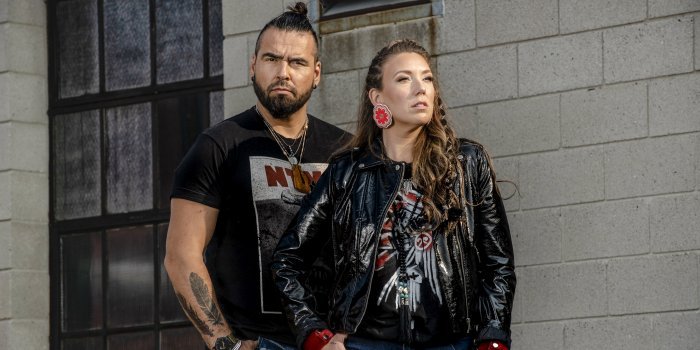Making a stop at Halifax’s Prismatic Arts Festival as part of their first full-length east coast tour, husband and wife duo Twin Flames are hoping to build cultural bridges by representing their Indigenous roots. He is Inuk & Mohawk, and she is Métis. Together, they combine to tell stories of courage and survival written in English, Inuttitut, and French.
“We’ve all missed human connections so much over this past year and a half, and I really hope that our tour will encourage people to realize how important live music is and perhaps create a greater understanding of what it is to be an Indigenous person in this country,” says Jaaji, who with his wife Chelsey June, make up the award-winning duo.
“What we’re really hoping for on this tour is that people will not be afraid of what they are going to discover because we are all about making people feel welcomed and comfortable,” adds June. “Kind of like singing around a campfire or your famous kitchen parties.”

While this will be Twin Flames‘ first comprehensive tour since the pandemic stopped most live performances, the two still managed to keep busy over the last 18 months, releasing their third studio album Omen in 2020 and honing their virtual performance skills.
“We were sitting on an almost finished album when the pandemic shut everything down, so we decided to build a home studio and we were somehow able to pull that off,” says June. “It was a great distraction, especially the first couple of months into the pandemic.”
As with many artists, Twin Flames also adapted their home studio for virtual performances allowing them to continue their musical outreach to schools across the country.
“We work with schools and school boards across Canada to give interactive musical concerts with cultural education tied in at the same time,” explains June. “We were very, very fortunate to continue to work, playing two to three shows a day sometimes from our home.”
But while Omen will be part of their east coast tour, the two see it as an opportunity to introduce themselves and their music to local audiences. “Some of the new songs are definitely in the set, but it’s not just focused on the album,” says June.
A big part of Twin Flames’ introduction to the east coast will come from their individual and collective musical history.
For Jaaji, a police officer in the Arctic until 2014, he first found himself turning to music as a way to escape.
“I took a very long hiatus from music and just started to write songs again, in those moments where I felt music was needed to heal or cope,” he says. “And then the songs started to gain popularity, and suddenly I was being invited to all these festivals. Fast forward seven years, and now we’re touring all over the world.”
I hope that when people see the word Indigenous beside the band name that they are inspired to come and learn more with us, talking about what Reconciliation means to us and parts of history that are not often shared and using music to communicate. – Jaaji
It would be what she characterizes as a “miserable job” with the federal government that would eventually see June pursue her own career in music.
“I’ve always been a very artistic person, and the things that made me truly happy, I was not fulfilling those in a nine to five,” she says. “And for me as well, music became this escape, and songwriting became a way of expressing what I was feeling, what I was going through and things that I felt like I couldn’t tell another living soul somehow would come out on that piece of paper.”
While both would initially turn to music separately, it would be a chance meeting on the set of a television show that would draw them together and on the road pursuing music together full-time.
“I was really scared because I hated performing in front of people,” says June. “But I just thought if I’m going to do it, I have to do it now because I’m not getting any younger because females in the industry are looked at a little differently than males, unfortunately.”
Taking the plunge, the two found themselves primarily touring the Arctic in the first couple of years of their time together.
“It was just incredible because we were so well received, and it really helped build the self-confidence that I needed to be a better performer and to be comfortable on stage,” she continues. “Jaaji helped us get that real tightness in what we do in order to really make an impact.”
While June credits her husband with helping unite their voices, he says their voices meshed instantly. There is also a connection between the two that transcends language as the duo moves freely between English, French and Inuttitut.
“What is very special is when I’ll be singing a song in Inuttitut and Chelsey can start singing in English what I’m singing,” he says.
“I don’t speak Inuttitut, so it is all based on emotion and feeling,” adds June.
Calling it an almost subconscious process, the two aren’t thinking about their songwriting or singing language in the moment.
“A lot of the times, we let the space we are in dictate how a song is going to be born,” he says. “That is often through the most accidental moments, whether a soundcheck, in a studio recording, or just sitting in the washroom.”
Following the tour, the future for Twin Flames includes a B-side release of Omen, a French-language album, plus a foray into literature with the publication of Maakusie Loves Music, the first of what they hope will become a series.
“It’s a children’s book that talks about the evolution of Inuit music and how it changed once contact arrived,” says June. “We hope it will help children understand that there’s not one way to make music while getting a little bit of cultural knowledge at the same time.”
For now, though, the focus is on bringing their music to audiences on the east coast.
“I hope that when people see the word Indigenous beside the band name that they are inspired to come and learn more with us, talking about what Reconciliation means to us and parts of history that are not often shared and using music to communicate,” says Jaaji.
Twin Flames plays as part of the 2021 Prismatic Arts Festival on October 3 at The Carleton in downtown Halifax. Visit prismaticfestival.com for tickets and more information.
For more information on Twin Flames and details of their other east coast tour dates, visit twinflamesmusic.com.


